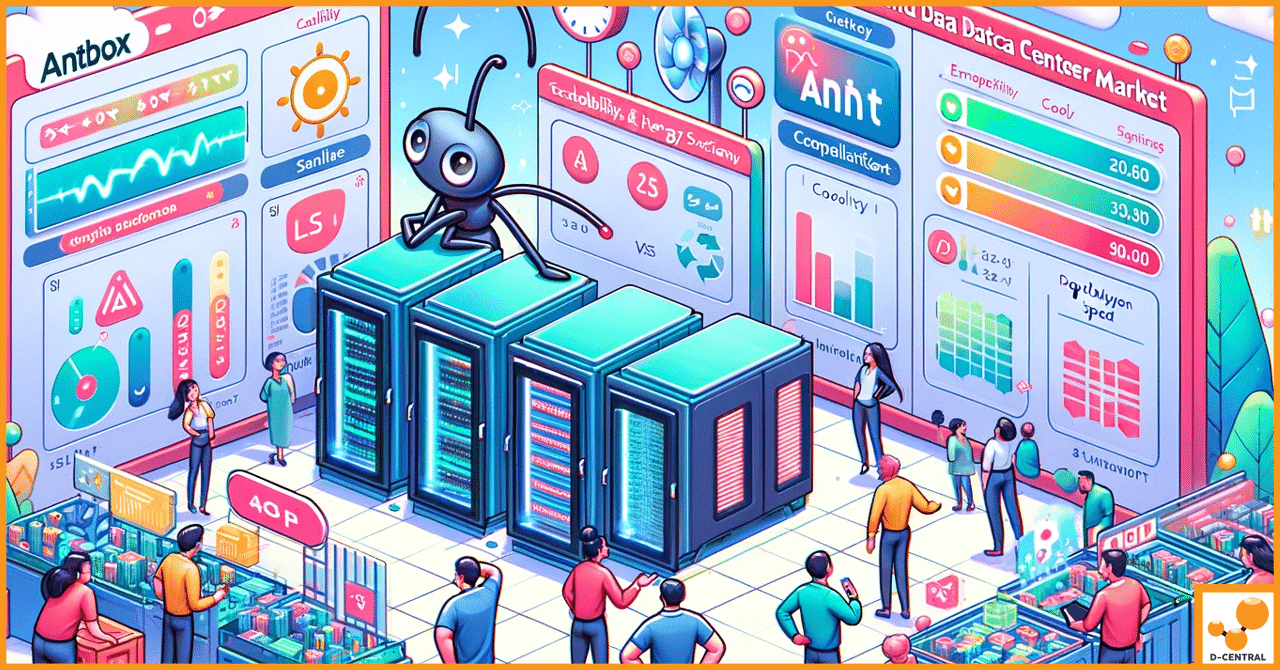The digital age is evolving at an unprecedented pace, with data becoming the cornerstone of decision-making, innovation, and connectivity. This surge in data generation and consumption necessitates robust, scalable, and efficient infrastructure solutions, leading to the rise of modular data centers. These prefabricated units, designed for rapid deployment and scalability, offer a flexible alternative to traditional brick-and-mortar data centers, catering to the dynamic needs of businesses across the globe.
Modular data centers have emerged as a pivotal element in today’s digital landscape, primarily due to their ability to adapt to varying computational demands while minimizing construction and operational costs. Their plug-and-play nature, coupled with energy-efficient designs, makes them particularly appealing for companies looking to expand their data capabilities without the extensive lead times and high capital expenditure associated with traditional data centers. Moreover, their inherent flexibility and scalability enable businesses to precisely align their IT infrastructure with their growth trajectories, ensuring that they can scale up or down as required without significant downtime or disruption.
In this rapidly expanding market, Antbox, a solution developed by Bitmain, has carved out a significant niche for itself. Antbox represents a leap forward in modular data center technology, offering a compact, mobile, and highly efficient solution that stands out for its ease of deployment and operation. Designed to cater to the needs of blockchain and cryptocurrency mining operations, Antbox brings forth an innovative approach to data center design, emphasizing energy efficiency, scalability, and security. Its role in the market is not just as a product but as a harbinger of the potential modular data centers hold in revolutionizing how businesses approach data infrastructure in the digital era.
Understanding Modular Data Centers
Modular data centers are modern IT infrastructure solutions designed for rapid deployment, high scalability, and efficient operation. Unlike traditional data centers, which are constructed as permanent facilities, modular data centers are pre-engineered and fabricated in a factory setting before being shipped to the site for quick assembly. These units can range from containerized modules, which house servers, storage, and networking equipment, to prefabricated buildings or pods that can be easily expanded or reconfigured based on demand.
The modular approach divides the data center into smaller, manageable blocks (modules) that can be independently deployed and operated. This modularity extends not only to the physical infrastructure but also to the power, cooling, and IT systems, allowing for a highly customizable and flexible data center environment.
Benefits Over Traditional Data Centers
- Scalability: Modular data centers allow for incremental expansion. Businesses can start small and add modules as their data needs grow, avoiding the upfront cost and space requirements of large traditional data centers.
- Speed of Deployment: Since modules are pre-manufactured, the time from planning to operation is significantly reduced, enabling businesses to respond more rapidly to market demands.
- Cost Efficiency: The prefabricated nature of modular data centers often leads to lower construction costs, and their design optimizes operational efficiency, reducing ongoing expenses related to energy use and cooling.
- Energy Efficiency: Modular data centers are designed with the latest cooling and power technologies, often incorporating green energy sources and advanced heat management systems to minimize their environmental impact.
- Flexibility and Portability: Modules can be relocated or repurposed as business needs change, offering a level of flexibility that traditional data centers cannot match.
Current Trends and Innovations
- Sustainability Initiatives: There is a growing emphasis on making modular data centers more sustainable by integrating renewable energy sources, such as solar and wind, and employing advanced cooling techniques that reduce energy consumption and carbon footprint.
- Edge Computing: With the rise of IoT and the need for low-latency processing, modular data centers are increasingly deployed at the edge of networks to bring computational power closer to where data is generated and consumed.
- AI and Automation: The use of artificial intelligence and automation in modular data centers is on the rise, enhancing operational efficiency by optimizing cooling, power usage, and workload distribution without human intervention.
- Hybrid Designs: New modular data center designs are emerging that blend the benefits of both modular and traditional approaches, offering the scalability and flexibility of modular components within a fixed infrastructure.
- Advanced Security Features: As data security becomes a paramount concern, modular data centers are being equipped with state-of-the-art security technologies, including biometric access controls and advanced surveillance systems, to safeguard critical data assets.
In summary, modular data centers represent a significant evolution in data center design, offering a flexible, efficient, and sustainable alternative to traditional infrastructure. With ongoing innovations in technology and design, they are set to play a crucial role in supporting the growing data needs of the digital world.
Antbox – An Overview
Antbox is a pioneering solution developed by Bitmain, a leading player in the field of cryptocurrency mining technology. Recognizing the need for more flexible, efficient, and scalable data center solutions, especially in the realm of blockchain and cryptocurrency mining, Bitmain ventured into the modular data center market with the introduction of Antbox. The development of Antbox was driven by Bitmain’s extensive experience in mining hardware and its deep understanding of the operational challenges faced by miners, including the need for rapid deployment, mobility, and energy efficiency.
Key Features and Specifications
- Mobility and Ease of Deployment: Antbox is designed for easy transportation and quick setup. Its containerized form factor allows it to be shipped and deployed virtually anywhere, providing immediate computational capacity upon connection to power and network resources.
- Scalability: With its modular design, Antbox can be easily scaled by adding more units, allowing mining operations to expand their capacity in line with their growth requirements without significant downtime or infrastructure overhaul.
- Energy Efficiency: Antbox incorporates advanced cooling and power management systems to optimize energy consumption, which is a critical factor in mining operations due to the high energy demands of mining hardware.
- High-Density Configuration: Designed to maximize space utilization, Antbox can house a significant number of mining rigs within its compact structure, making it an ideal solution for operations looking to maximize computational power in limited spaces.
- Robust Build and Security: Constructed to withstand various environmental conditions, Antbox is built with durability in mind. It also features enhanced security measures to protect valuable mining equipment and data.
Unique Selling Propositions in the Modular Data Center Market
- Tailored for Cryptocurrency Mining: Unlike generic modular data centers, Antbox is specifically designed to meet the needs of cryptocurrency mining operations, offering optimizations that cater to the high-performance and energy-intensive nature of mining activities.
- Rapid Deployment Cycle: The turnkey nature of Antbox, combined with Bitmain’s mining expertise, ensures that mining operations can be up and running in a fraction of the time it would take to set up a traditional data center, providing a significant competitive edge.
- Integrated Ecosystem: Antbox is part of Bitmain’s broader ecosystem of mining solutions, including state-of-the-art mining rigs like the Antminer series. This integration ensures seamless compatibility and performance optimization, offering a comprehensive solution for miners.
- Flexibility and Adaptability: The portable and modular design of Antbox allows for deployment in diverse locations, from remote areas to urban settings, providing flexibility that traditional data centers cannot match. This adaptability makes Antbox an attractive option for operations looking to capitalize on geographic arbitrage opportunities, such as areas with lower electricity costs.
- Cost-Effectiveness: By minimizing infrastructure and operational costs, Antbox presents a cost-effective solution for rapidly scaling mining operations without the hefty investment typically associated with building and maintaining traditional data center facilities.
In summary, Antbox stands out in the modular data center market with its specialized focus on cryptocurrency mining, combining Bitmain’s industry-leading expertise with innovative design to offer a solution that is fast to deploy, highly scalable, energy-efficient, and optimally configured for the demands of modern mining operations.
Competitors in the Market
In the realm of cryptocurrency mining, the competition extends beyond traditional modular data center providers to include companies specializing in Bitcoin mining containers and computing modular solutions. These entities offer products that are more directly comparable to Bitmain’s Antbox, focusing specifically on the needs of the cryptocurrency mining industry. These solutions are designed to maximize efficiency, scalability, and mobility, catering to the unique demands of high-density computing required for Bitcoin mining.
Direct Competitors in Bitcoin Mining Containers
Canaan Creative
- Overview: Known for its Avalon series of Bitcoin miners, Canaan also offers mining container solutions designed to be energy-efficient and easily deployable.
- Key Features: Canaan’s mining containers are built for optimal cooling and high-density mining operations, providing a plug-and-play solution for miners looking to scale quickly.
- Market Positioning: Targets large-scale mining operations and mining farms looking for reliable, efficient, and scalable mining solutions.
MicroBT
- Overview: The maker of the WhatsMiner series of mining rigs, MicroBT, has ventured into the mining container market, offering solutions that complement its high-performance miners.
- Key Features: MicroBT’s containers are designed for durability, efficient cooling, and high-capacity mining, accommodating a large number of WhatsMiner units for maximized productivity.
- Market Positioning: Focuses on industrial-scale miners and enterprises seeking high-efficiency mining operations with rapid deployment capabilities.
SBI Crypto
- Overview: A subsidiary of SBI Holdings, SBI Crypto offers mining services and has developed its own mining container solutions to support its operations and those of its clients.
- Key Features: SBI Crypto’s containers are engineered for harsh environments, ensuring the reliability and longevity of mining operations, even in extreme conditions.
- Market Positioning: Aims at institutional and large-scale miners requiring robust and resilient mining infrastructure for continuous operation.
BlockBox by Bitfury
- Overview: Bitfury, a leading full-service blockchain technology company, offers the BlockBox AC, a mobile Bitcoin mining unit that houses Bitfury’s mining servers.
- Key Features: The BlockBox AC is one of the most powerful and efficient mobile mining solutions on the market, featuring an advanced cooling system and a modular design for easy expansion.
- Market Positioning: Targets large-scale industrial mining operations looking for turnkey solutions that can be rapidly deployed and scaled.
Comparison with Antbox
- Scalability: Similar to Antbox, these competitors offer scalable solutions that allow mining operations to expand by adding more containers as demand grows.
- Energy Efficiency: Energy efficiency is a critical factor for all Bitcoin mining container providers, with each company implementing innovative cooling and power management technologies to minimize electricity consumption and costs.
- Deployment Speed: Rapid deployment is a common theme among these solutions, with companies like Bitfury’s BlockBox and Canaan’s mining containers designed for quick setup to accelerate the start of mining operations.
- Customization and Flexibility: While Antbox is optimized for Bitmain’s own mining rigs, competitors like MicroBT and SBI Crypto offer containers that can accommodate different types of mining hardware, providing flexibility for miners with diverse equipment.
In summary, the market for Bitcoin mining containers is competitive, with several key players offering solutions that rival Bitmain’s Antbox in terms of efficiency, scalability, and deployment speed. These specialized containers are tailored to meet the high demands of cryptocurrency mining, providing the infrastructure needed for profitable operations in the rapidly evolving digital currency landscape.
Comparative Analysis – Antbox vs. Other Providers
The modular and containerized data center market, especially tailored for Bitcoin mining, is highly competitive. Antbox, developed by Bitmain, stands out for its unique features but faces stiff competition from other providers like Canaan Creative, MicroBT, SBI Crypto, and Bitfury’s BlockBox. Here’s a detailed comparison based on various critical parameters:
Scalability
- Antbox: Offers significant scalability through its containerized approach, allowing miners to add more units as their operations grow. Its design is particularly suited for Bitmain’s mining rigs, facilitating easy expansion within Bitmain’s ecosystem.
- Competitors: Similar to Antbox, competitors like Canaan and MicroBT provide scalable solutions that can be expanded by adding additional containers. Bitfury’s BlockBox also emphasizes scalability, with a focus on high-density configurations to maximize space and power usage.
Energy Efficiency
- Antbox: Designed with energy efficiency in mind, incorporating advanced cooling systems to manage the high heat generated by mining operations, aiming to reduce overall electricity consumption.
- Competitors: Energy efficiency is a paramount concern for all providers. Bitfury’s BlockBox, for example, features an advanced cooling system to ensure optimal performance with minimal energy waste. Canaan and MicroBT also focus on energy-efficient designs to keep operational costs low for miners.
Security Features
- Antbox: Includes robust security measures to protect the valuable mining hardware and data contained within. However, specific security features may vary based on deployment and customer requirements.
- Competitors: Providers like Bitfury emphasize security, with the BlockBox offering comprehensive physical and cybersecurity measures. SBI Crypto’s solutions are also known for their resilience and security, especially in challenging environmental conditions.
Customization and Flexibility
- Antbox: While offering some level of customization, Antbox is primarily optimized for Bitmain’s mining hardware, which might limit flexibility for users with diverse mining rigs.
- Competitors: Companies like Canaan and MicroBT offer more flexibility in accommodating different types of mining hardware within their containers. Bitfury’s BlockBox is highly customizable, catering to the specific needs of large-scale mining operations.
Cost-Effectiveness
- Antbox: Provides a cost-effective solution by minimizing upfront investment and offering a turnkey solution for rapid deployment, which can lead to quicker ROI for miners.
- Competitors: The cost-effectiveness of competitors varies, with Bitfury’s BlockBox being a premium option due to its high-density and advanced features. Canaan and MicroBT strive to offer competitive pricing while balancing performance and efficiency.
Customer Support and Services
- Antbox: Bitmain is known for its comprehensive customer support, offering maintenance services and technical assistance to ensure smooth operation.
- Competitors: Bitfury and Canaan are recognized for their excellent post-sale support and maintenance services, providing peace of mind to their customers. MicroBT and SBI Crypto also emphasize strong customer service to enhance user experience.
Innovation and Future-Readiness
- Antbox: Continuously evolves with Bitmain’s advancements in mining technology, ensuring compatibility with the latest mining rigs and efficiency improvements.
- Competitors: Bitfury’s BlockBox is at the forefront of innovation, incorporating the latest in cooling and power management technologies. Canaan and MicroBT also invest in research and development to keep their solutions competitive and future-ready.
In summary, while Antbox offers a robust, scalable, and efficient solution tailored for Bitmain’s mining hardware, its competitors provide varying degrees of scalability, energy efficiency, security, and flexibility. The choice between Antbox and other providers ultimately depends on the specific needs of the mining operation, including the type of mining hardware used, desired scalability, budget constraints, and the importance of customer support and innovation in their operational strategy.
Choosing the Right Provider
Selecting the ideal modular data center provider for Bitcoin mining or other computational needs involves careful consideration of various factors. The decision impacts not only the immediate operational efficiency and cost-effectiveness of your mining activities but also their long-term viability and adaptability to evolving technological landscapes.
Factors to Consider
- Compatibility with Mining Hardware: Ensure the modular data center is compatible with your existing or planned mining hardware. This includes physical dimensions, power requirements, and cooling needs.
- Scalability: The provider should offer solutions that can grow with your operations. Scalability is crucial for adapting to changes in demand, mining difficulty, and the introduction of new, more efficient mining rigs.
- Energy Efficiency: Given the significant energy consumption of mining operations, the energy efficiency of the modular data center is paramount. Look for providers that offer advanced cooling solutions and energy management systems to minimize operational costs.
- Deployment Speed: Time is money in the mining world. The faster you can deploy and operationalize your data center, the quicker you can start mining. Evaluate the provider’s track record for quick and reliable deployments.
- Security Measures: Physical and cyber security measures are essential to protect your valuable hardware and mined cryptocurrency. Assess the security features of the modular data center, including access controls, surveillance, and data protection protocols.
- Environmental Impact: With increasing scrutiny on the environmental impact of cryptocurrency mining, consider providers that prioritize sustainability through the use of renewable energy sources and other green initiatives.
Role of Customization, Scalability, and Decision-Making Support
- Customization: Your chosen provider should offer a degree of customization to meet your specific operational needs, whether it’s integrating specific cooling technologies, accommodating diverse hardware, or ensuring compatibility with renewable energy sources.
- Scalability: The provider’s ability to support the scalable nature of your operations is crucial. This includes not just adding more units or modules, but also the ease with which these expansions can be integrated into your existing setup.
- Decision-Making Support: Look for providers that offer consultative services to help you make informed decisions about the configuration, deployment, and expansion of your modular data center. This support can be invaluable in navigating the complexities of modern mining operations.
Long-Term Considerations
- Sustainability: As the digital currency market evolves, so too does the emphasis on sustainable mining practices. Choose a provider that is committed to reducing the environmental impact of their solutions and can demonstrate this commitment through their products and practices.
- Energy Efficiency: The long-term cost-effectiveness of your mining operation will be significantly influenced by the energy efficiency of your modular data center. Consider providers that are at the forefront of energy-efficient design and technology.
- Technological Advancements: The cryptocurrency mining sector is rapidly evolving, with frequent advancements in mining hardware and algorithms. Your modular data center should be flexible enough to adapt to new technologies and efficient enough to remain viable as the landscape changes.
In summary, selecting the right modular data center provider requires a holistic approach that considers immediate operational needs and long-term strategic goals. By prioritizing compatibility, scalability, energy efficiency, and sustainability, and by choosing a provider that offers customization and strong decision-making support, you can ensure that your mining operations are positioned for success now and in the future.
Conclusion
In this exploration of the modular data center market, particularly within the realm of cryptocurrency mining, we’ve delved into the intricacies of selecting the right provider to meet the dynamic needs of modern digital operations. From the innovative Antbox by Bitmain to its competitors like Canaan Creative, MicroBT, SBI Crypto, and Bitfury’s BlockBox, the market is rich with options, each offering unique features tailored to specific operational requirements.
The key points we’ve discussed underscore the importance of scalability, energy efficiency, security, customization, cost-effectiveness, and customer support in making an informed choice. These factors are not just critical for the immediate success of deploying a modular data center but also play a pivotal role in ensuring its long-term viability in an ever-evolving technological landscape.
The decision to select a modular data center provider should not be taken lightly. It requires a thorough comparison and in-depth research to understand how each provider’s offerings align with your specific needs, whether it’s for Bitcoin mining or other computational purposes. The right choice can significantly impact the efficiency, sustainability, and profitability of your operations.
Looking ahead, the future of modular data centers appears promising, with continuous advancements in technology paving the way for more sustainable, efficient, and adaptable solutions. As the digital landscape evolves, the flexibility and scalability offered by modular data centers will become increasingly crucial, enabling businesses to swiftly adapt to new challenges and opportunities.
We encourage readers to embark on their research journey, carefully evaluating their unique requirements against what each modular data center provider offers. Don’t hesitate to reach out to providers, including Antbox and its competitors, for detailed consultations, further information, and tailored advice. In the rapidly shifting world of digital infrastructure, making an informed decision is more important than ever, ensuring your operations are not just prepared for today’s demands but are also future-ready.
FAQ
What is a modular data center?
A modular data center is an IT infrastructure solution that prioritizes rapid deployment, high scalability, and efficient operation. It differs from traditional data centers by being pre-engineered and fabricated for quick assembly, offering a flexible and portable option for businesses.
How do modular data centers compare to traditional data centers?
Modular data centers offer several benefits over traditional data centers, including scalability, speed of deployment, cost efficiency, energy efficiency, and flexibility. They enable businesses to incrementally expand their data capabilities and are generally more economical concerning both capital expenditure and operational costs.
What is Antbox and how does it fit into the modular data center market?
Antbox is a modular data center solution developed by Bitmain, catering specifically to blockchain and cryptocurrency mining operations. It stands out for its compact, mobile design, speed of deployment, and energy efficiency, making it an innovative approach to data center design in the digital and blockchain era.
Who are the main competitors of Antbox in the cryptocurrency mining market?
The main competitors of Antbox include companies such as Canaan Creative, MicroBT, SBI Crypto, and Bitfury (with its BlockBox). These companies offer Bitcoin mining containers and computing modules that focus on efficiency, scalability, and rapid deployment, similar to Antbox.
What factors should be considered when choosing a modular data center provider for Bitcoin mining?
Factors to consider include compatibility with mining hardware, scalability of the solution, energy efficiency, deployment speed, security measures, environmental impact, and the provider’s expertise in customization and scalability. Customer support, sustainability initiatives, and readiness for technological advancements also play crucial roles.
How do sustainability and technological advancements impact the selection of modular data centers?
Sustainability and technological advancements are vital for ensuring the long-term viability and cost-effectiveness of modular data centers. Providers committed to reducing environmental impact and integrating the latest in energy-efficient design and technology can offer solutions that remain competitive and viable as the mining landscape evolves.




